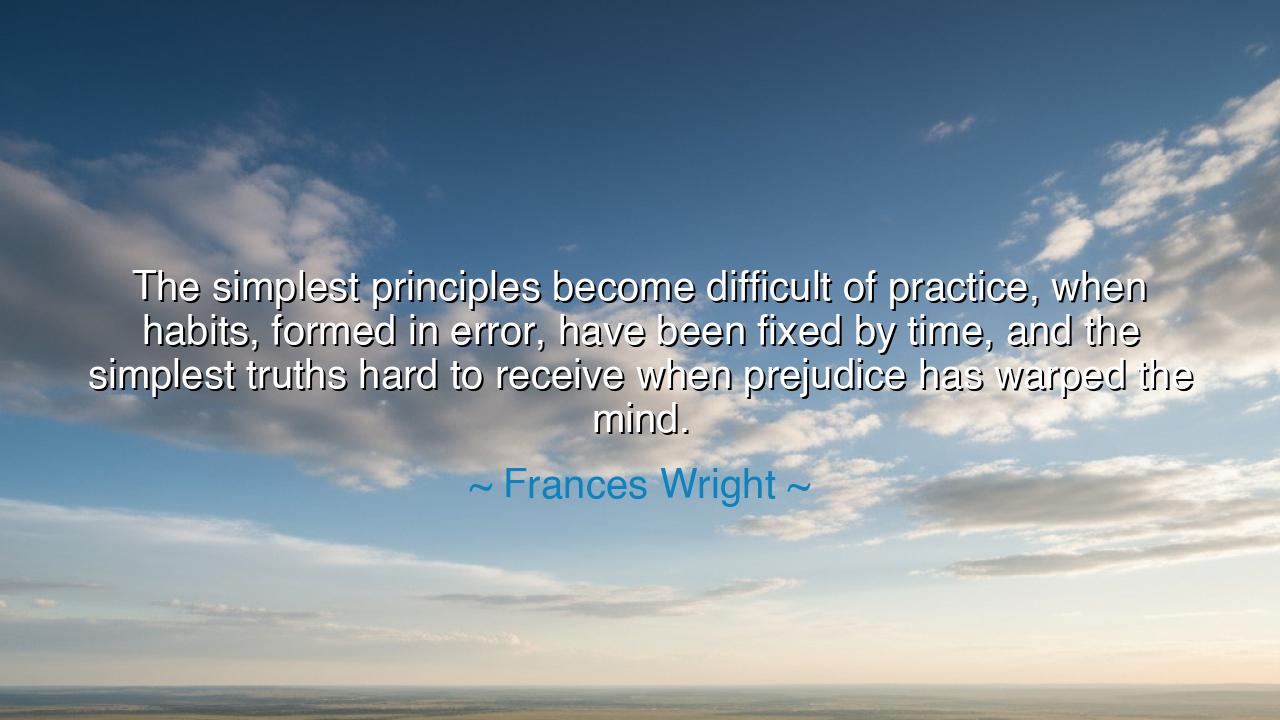
The simplest principles become difficult of practice, when
The simplest principles become difficult of practice, when habits, formed in error, have been fixed by time, and the simplest truths hard to receive when prejudice has warped the mind.






Hear the immortal words of Frances Wright, who with clarity of thought declared: “The simplest principles become difficult of practice, when habits, formed in error, have been fixed by time, and the simplest truths hard to receive when prejudice has warped the mind.” This is no idle observation, but a revelation of one of the greatest struggles of the human condition: that while truth may be plain, and virtue clear, it is the chains of habit and the shadows of prejudice that keep mankind bound in ignorance and folly.
For what are simplest principles? They are the laws written upon the heart: to act with justice, to show kindness, to speak truth, to live in moderation. These are not hidden, nor are they beyond the grasp of the lowly or the great. And yet, Wright speaks rightly—they are hard to live. Why? Because once habits have been shaped in error, once the soul has been bent by years of wrong practice, even the clearest light of truth feels heavy, and the straight path seems too narrow to walk.
The ancients knew this well. Consider the words of Aristotle, who taught that virtue is not a single act but a habit, formed by repeated practice until the soul bends naturally toward the good. And just as the body grows strong or weak by repeated movements, so too does the mind grow sound or corrupted by repeated choices. If one has lived long in error, those errors harden like clay baked by the sun, and even the simplest principle feels like a foreign command.
The same is true of prejudice, which Wright names as the warping of the mind. Prejudice blinds not by darkness but by distortion, turning truth into falsehood and falsehood into truth. When the mind has been trained to see through the crooked glass of bias, even the simplest truth appears suspicious. History abounds with such examples: when Galileo declared that the earth moves around the sun, the truth was simple, but prejudice, born of tradition and fear, branded him heretic. Thus we learn that the enemy of truth is not its complexity, but the habits and prejudices that resist it.
Consider also the weight of slavery in nations past. The principle that all men are created equal is simple, shining like the sun. Yet when generations were raised in the habit of treating one race as inferior, when prejudice warped hearts and minds, this truth seemed impossible to many. Only through great struggle, sacrifice, and blood was the error broken. This example reveals how deeply time entrenches falsehood, and how fiercely the soul must fight to receive even the plainest truth.
Thus, Wright’s words are not mere lament but a summons to vigilance. They call us to guard against the formation of wrong habits, for once they take root, they grow strong as oaks. They urge us to cast aside prejudice, for it poisons the mind, making truth unwelcome even when it shines clearly before our eyes. They remind us that wisdom is not simply knowing what is right, but training ourselves to love and practice it until it becomes natural.
The lesson, then, is clear: do not despise the simple principles of life—truth, justice, kindness, humility—but honor them daily, in small acts, until they form the fabric of your being. And when you encounter a truth that challenges your heart, ask yourself if it is truly false, or if your prejudice resists it. Be willing to unlearn, to bend, to be remade, for only the humble can receive wisdom.
So let your action be this: examine your habits, and ask if they were formed by truth or by error. Break the ones that chain you, however long they have bound you. Examine your prejudices, and ask if they are warping your sight. Train your mind and spirit in what is just and true, day by day, until the simplest principles are not burdens to practice but joys to live. For only then will you walk as one truly free.






AAdministratorAdministrator
Welcome, honored guests. Please leave a comment, we will respond soon